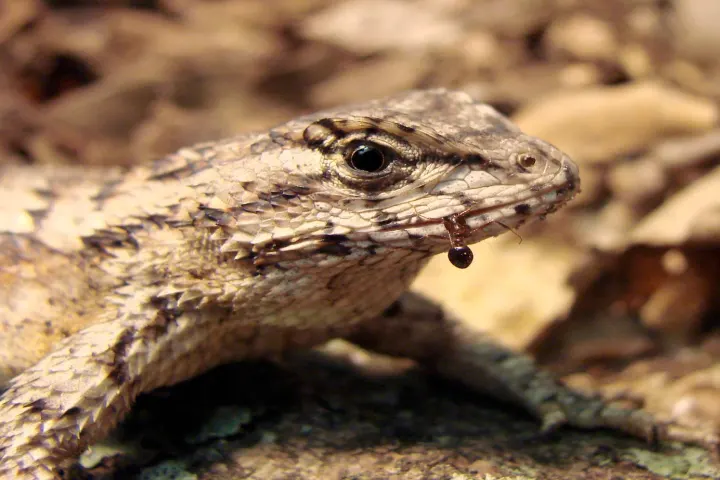

The eastern fence lizard eating the fire ants (Pic. Courtesy sciencealert.com)
For survival it is imperative to adapt and evolve and that is what a new study has found among the lizards. As per a report in sciencealert.com, eastern fence lizards found in eastern part of the United States are eating venomous fire ants, who originally belong to South America and are invasive pests in the US, thereby gaining protection against their lethal bites.
Eating and breaking down the ants and their poison may make the body of the lizards prepare to fight it. This leads to the postulate that species native to an area can preserve themselves against invasive invaders, enabling the former to live along with the latter instead of becoming extinct.
Talking about the study which was published in Biological Invasions, Tracy Langkilde, a biologist at Pennsylvania State University of Penn State said: “We know that lizards from areas with fire ants have different immune profiles than lizards in areas without them. Because the immune system is so critical for survival, we wanted to determine if these differences in immune profiles can be directly attributed to lizards frequently being stung by fire ants, eating fire ants, or something else.”
For these lizards an adequate amount of ant’s venom can be deadly and both species have been sharing the common habitat for 70 years.
What got researchers’ attention was that the immune profile of eastern fence lizards that lived close to these ants varied from those that didn’t. Hence, they decided to study them.
During the research, for three weeks a group of 17 lizards was provided fire ants to eat – the Fed group — while another 18 lizards were bitten by these ants three times a week and referred to as Stung group. The two groups were assessed for six different measures of immune response.
Sharing details, Catherine Tylan, Penn State biologist who led the research informed: “We conducted a comprehensive assessment of most branches of the immune system, including measures of the innate immune system – resources that an individual is born with – and the adaptive immune system, which develops immune resources after exposure to a foreign substance like an infection or vaccine. This allowed us to see how different immune resources are allocated in response to fire ant exposure.”
The Fed group’s three immune measures reflected an increase. There was spurt in basophils – white blood cells which take care of inflammatory reactions in immune response; immunoglobulin antibody – known to counter venom of fire ant; and in complement activity that assist immune response of the body.
Tynan noted all three increases would aid the lizard to fight fire ant venom. “For example, the fire ant-specific antibodies and complement could help bind up venom so it can no longer negatively impact the body. It’s possible that exposure to fire ant venom from the consumed fire ants stimulates an increased immune response, acting somewhat like a vaccine. So, eating fire ants may incidentally help lizards prepare for future venom exposure from stings.”
Comparing the Fed group to wild lizards sharing habitat with fire ants showed certain likeness in immune profiles. The higher basophil and fire ant-specific IgM counts were similar, pointing to eating of fire ants. There were differences which could be attributed to stress induced in wild lizards due to interaction with these ants.
The study shows how species native to a region can adjust to changes in the ecology. Summing up the study, the researchers wrote: “The potentially protective effects of sub-lethal consumption of toxic/venomous invasive species, may allow native populations to survive and coexist with these otherwise deadly invaders.”
Also read: Poisonous false widow spiders trap and feed on England’s protected bats
Union Minister of Ports, Shipping and Waterways, Sarbananda Sonowal, said on Monday that the number…
The inhabitants of Pakistan-occupied Jammu and Kashmir (PoJK) have been enduring years of neglect as…
The Defence Research and Development Organisation (DRDO) is set to make a significant impact at…
Cyprus President Nikos Christodoulides and Prime Minister Narendra Modi on Monday viewed the mountains near…
Cyprus President Nikos Christodoulides said he and Prime Minister Narendra Modi discussed expanding bilateral ties…
Prime Minister Narendra Modi said on Monday that India and Cyprus will develop a strong…